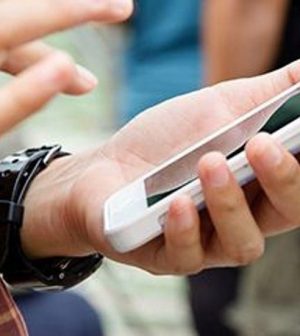- Recognizing the Signs of Hypothyroidism
- 10 Strategies to Overcome Insomnia
- Could Artificial Sweeteners Be Aging the Brain Faster?
- Techniques for Soothing Your Nervous System
- Does the Water in Your House Smell Funny? Here’s Why
- Can a Daily Dose of Apple Cider Vinegar Actually Aid Weight Loss?
- 6 Health Beverages That Can Actually Spike Your Blood Sugar
- Treatment Options for Social Anxiety Disorder
- Understanding the Connection Between Anxiety and Depression
- How Daily Prunes Can Influence Cholesterol and Inflammation
Text ‘Nudges’ May Help Boost Vaccination Rates

Text “nudges” about easy access to COVID-19 vaccines can increase vaccination rates, even among people hesitant to get a shot, a new study suggests.
“We found that text messages stressing the accessibility of the vaccine — and that included ownership language, such as that the vaccine has just been made available to you and to claim your dose today — significantly increased vaccine uptake,” study co-author Dr. Daniel Croymans said in a University of California, Los Angeles (UCLA) news release. He’s medical director of quality and primary care physician at UCLA Health.
As the highly contagious Delta variant of COVID-19 gains headway, scientists are looking for ways to boost COVID vaccination rates in order to reduce serious illness, hospitalizations and deaths.
For this study, researchers analyzed data from two trials with UCLA Health patients, most older than 65, who were eligible for COVID-19 vaccination in January and February 2021. In the first trial, about 93,000 participants who’d already been notified of their eligibility for the vaccine received one of four types of text reminders or no text reminders.
The reminders consisted of: a simple text; a text with an informational video; a text with ownership language such as “The vaccine has just been made available for you” or “claim your dose”; or a text with both the ownership language and informational video.
All reminders included a link for patients to schedule a vaccination appointment within the health system.
Six days after the reminders were sent, appointment rates were nearly twice as high among those who received them than among those who didn’t (13% versus 7%), the findings showed. One month later, vaccination rates were almost 18% for those who received the reminders, compared with nearly 14% for those who didn’t get the reminders.
Including ownership language in the reminder gave an additional boost to appointment and vaccination rates, but adding video did not, the researchers said.
The second trial included more than 67,000 people who did not schedule an appointment after receiving the first reminder. Eight days after the first reminder, some were sent a second reminder text.
Those who received the second reminder were almost 2% more likely to schedule an appointment for their first dose within six days and about 1% more likely to actually get the shot, compared to those who didn’t get a second reminder, according to the report.
While it’s a small difference, people in the second trial were initially hesitant about getting vaccinated at all, the study authors noted. The results were published Aug. 2 in the journal Nature.
“One simple reminder, which is cost effective, could prompt people to schedule their appointment,” said study co-author Silvia Saccardo, an assistant professor in Carnegie Mellon University’s department of social and decision sciences.
“Getting scheduled for the first dose was the biggest barrier. Once scheduled, people went to the appointment and then returned for their second dose,” Saccardo said.
More information
The U.S. Centers for Disease Control and Prevention has more on COVID-19 vaccines.
SOURCE: University of California, Los Angeles, news release, Aug. 2, 2021
Source: HealthDay
Copyright © 2026 HealthDay. All rights reserved.










